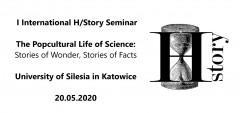Bankowa
Katowice, Slaskie
Poland
| Name | Alicja Bemben | |
| Telephone | 662640230 | |
| [email protected] | ||
| Website | www.hstory.us.edu.pl |
For decades, we have been fed scientific and popcultural stories of the “we use only 10% of our brain capacity” sort. Recently, a set of new truths has been granted to us. For instance, in his 2014 popscience book Hirnrissig [Harebrained], the neurobiologist Henning Beck debunks 20 of the most widespread neuromyths, including the ubiquitous misconception that our brains work like superfast computers with limitless capacity and the idea that you can train your brain as if it were a muscle. Although these revelations of his are not new to people whose data consumption revolves around topics of trivia, anecdotes and scientific myths, others may appear indeed surprising. Bearing in mind the popularity of the theory that mirror neurons govern our behaviour, it is rather surprising to read that the scientists involved have merely put forward some preliminary observations on the basis of experiments conducted on monkey brains; and that it is far too early to create parallels and explain complex human behaviours through mirror neurons theories.
Since Beck’s revelations are in no way exclusive, they support – along with many other recent discoveries – the view that there is a larger trend or predilection we, collectively, are guilty of: we take an interesting kernel of truth, a piece of trivia encountered by accident, and we run with it, creating and spreading wild theories, without so much as checking the source. Science and popculture are particularly susceptible to these kinds of interpretation: when presented to a non-specialist audience, a fact is filtered through relatable analogies and helpful metaphors which nonetheless simplify and dilute it. As a result, noble efforts at popularising science also open facts to abuse. As history teaches us, it takes only one unsubstantiated study to create a movement of people who distrust the scientific consensus so much that they will not vaccinate their children.
Thus, the paradox that haunts popculturally disseminated knowledge in the age of Instagram is that, to reach many, popcultural scientists often promote simplistic versions of complex phenomena and thus discourage time-consuming in-depth analyses, to the detriment of both the addressees and sciences themselves. However, as an important intellectual commodity whose influence on our everyday life is difficult to exaggerate, science disseminated in the popcultural form should not be disregarded. Not only is it an immensely popular phenomenon but, what is perhaps more important, it shapes the trajectory of how we see and how we will see the value of scientific knowledge in the future.
Having this in mind, we invite scholars of various fields to present their take on the popcultural life of science: examples, consequences and side effects of popularisation of scientific knowledge through weird tales, strange fictions and stories of wonder. Among the specific themes that might be covered in ten-minute long presentations are the following (the list is by no means exhaustive):
• popcultural representations of science and scientists
• scientification of popculture versus “popculturing” of science – mechanisms, processes, consequences and side effects
• relationships between scientific and popcultural discourses
• how to “science” in the age of Instagram – popularity, money and responsibility
• tale of science or tale of wonder?
• “get fact” – science in the service of clicks
• popcultural narratives of scientific problems – scientific facts or myths
• mythbusting – demystifying and remystifying science in popculture
• popculture as new mythology of science
• mythos, pathos and logos in the stories of science
• funification of science
• popcultural functions of science
• popculture as science/science as popculture
• popcultural contributions to science

|
Empty
|
|
Empty
|
|
Empty
|
